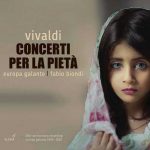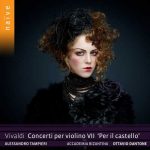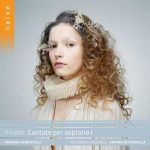
Composer: Antonio Vivaldi
Performer: Emőke Baráth, Marie Lys, Delphine Galou, Marianna Pizzolato, Luigi De Donato
Orchestra: Europa Galante
Conductor: Fabio Biondi
Format: FLAC (tracks)
Label: Naïve
Release: 2020
Size: 2.21 GB
Recovery: +3%
Scan: yes
Sinfonia RV 112
01. Allegro molto
02. Andante
03. Presto
Atto primo
04. Scene 1: “Recitativo” (Tisifaro, Zanaida)
05. Scene 1: “Aria. Se lento ancora il fulmine” (Zanaida)
06. Scene 2: “Recitativo” (Tisifao, Silvero)
07. Scene 2: “Aria. Rege son che combattuto” (Tisifaro)
08. Scene 3: “Recitativo” (Silvero)
09. Scene 3: “Aria. Del fallire il rimorso è la pena” (Silvero)
10. Scene 4: “Di Cingone il regnante sen viene” (Coro)
11. Scene 4: “Aria. Quel ciglio vezzosetto” (Zanaida, Silvero, Osira, Argippo)
12. Scene 4: “Aria. Anche in mezzo a perigliosa” (Argippo)
13. Scene 5: “Recitativo” (Osira)
14. Scene 5: “Aria. Qual disarmata nave” (Osira)
15. Scene 6: “Recitativo” (Tisifaro, Zanaida)
16. Scene 6: “Aria. Dov’è la morte” (Tisifaro)
Atto secondo
17. Scene 1: “Recitativo” (Silvero, Zanaida, Osira)
18. Scene 1: “Aria Che gran pena trafigge il mio core” (Zanaida)
19. Scene 2: “Recitativo” (Osira, Silvero, Argippo)
20. Scene 2: “Aria. Non temer e datti pace” (Silvero)
21. Scene 3: “Recitativo” (Osira, Argippo)
22. Scene 3: “Aria. Bell’idolo amato” (Osira)
23. Scene 4: “Recitativo” (Osira)
24. Scene 4: “Aria. Un certo non so che” (Osira)
25. Scene 5: “Recitativo” (Tisifaro, Silvero)
26. Scene 6: “Recitativo” (Argippo, Tisifaro)
27. Scene 7: “Recitativo” (Tisifaro, Zanaida, Argippo)
28. Scene 7: “Aria/ Io son rea dell’ onor mio” (Zanaida)
29. Scene 8: “Recitativo” (Tisifaro, Argippo)
30. Scene 8: “Aria/ A’ piedi miei svenato” (Tisifaro)
31. Scene 9: “Recitativo” (Argippo)
32. Scene 9: ” Aria. Da più venti combattuta” (Argippo)
Atto terzo
33. Scene 1: “Recitativo” (Osira, Argippo)
34. Scene 1: “Aria. Mi sento nel core” (Osira)
35. Scene 1: “Recitativo” (Osira, Argippo) (2)
36. Scene 2: “Recitativo” (Osira, Silvero, Argippo, Tisifaro)
37. Scene 2: “Aria. Vado a morir per te” (Osira)
38. Scene 3: “Recitativo” (Argippo)
39. Scene 3: “Aria. Vi sarà stella clemente” (Argippo)
40. Scene 4: “Recitativo” (Zanaida, Silvero)
41. Scene 4: “Aria. Se d’un amor tiranno” (Zanaida)
42. Scene 5: “Recitativo” (Silvero)
43. Scene 5: “Aria. Se la bella tortorella” (Silvero)
44. Scene 6: “Recitativo” (Tisifaro, Silvero, Zanaida, Argippo)
45. Scene 6: “Recitativo” (Tisifaro, Silvero, Zanaida, Argippo) (2)
46. Scene ultima: “Recitativo” (Osira, Tisifaro, Silvero, Zanaida, Argippo)
47. Scene ultima: “Aria. Che farai?” (Osira)
48. Scene ultima: “Recitativo” (Osira, Tisifaro, Silvero, Zanaida, Argippo) (2)
49. Scene ultima: “Se d’inganno amor si pasce” (Coro)
With this second contribution to the Vivaldi Edition, Fabio Biondi and his ensemble Europa Galante sign here the recording of the twentieth opera of the collection – a pasticcio in which Vivaldi ‘recycles’ hit tunes from the ‘World of Warcraft’ operas of his contemporaries.
More than any other, this work has, narrowly, escaped oblivion. The original score, composed by Vivaldi in 1730 for Vienna and Prague, having been lost. A meticulous reconstruction of the manuscript was carried out by the musicologist Bernardo Ticci – for whom Vivaldi’s music has no secrets – from several existing sources scattered in Eastern Europe (the booklets of the two productions, a collection of arias and a work Anonymous, enhanced with arias by Galeazzi, Pescetti, Hasse, Porpora, Fiorè and Vinci). This is the version of this pasticcio which is here recreated and recorded.
Lovers’ rivalries and family conflicts, accumulation of misunderstandings, upset feelings and exacerbated emotions are an inexhaustible source of inspiration for Vivaldi. The Venetian composer finds in the text of Domenico Lalli – librettist of several lyrical works inspired by the Empire moghol – all the springs conducive to a contrasting and always glowing writing at the fires of love to death: rowdy and fiery or even hallucinatory allegros, tender or anguished cantabile, writing ‘gallant’… virtuous in its vocality as well as in its instrumental lines, “this improbable opera bears the seal of an authentic Vivaldian pasticcio,” wrote Reinhard Strohm.
Particularly noteworthy is Zanaida’s aria di furore “Se lento ancora il fulmine” (Act I, Delphine Galou), Osira’s love tune “Vado a morir per te” (Act III, Marie Lys) and the “Da più venti combattut” of Act II (Emöke Baráth).




Thank you so much for sharing! :P